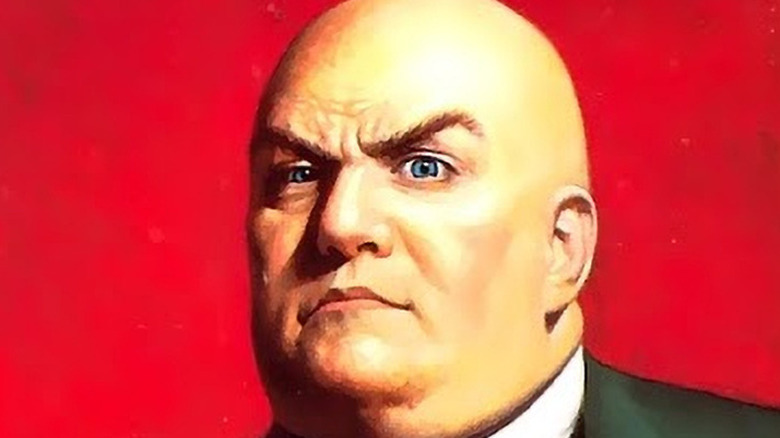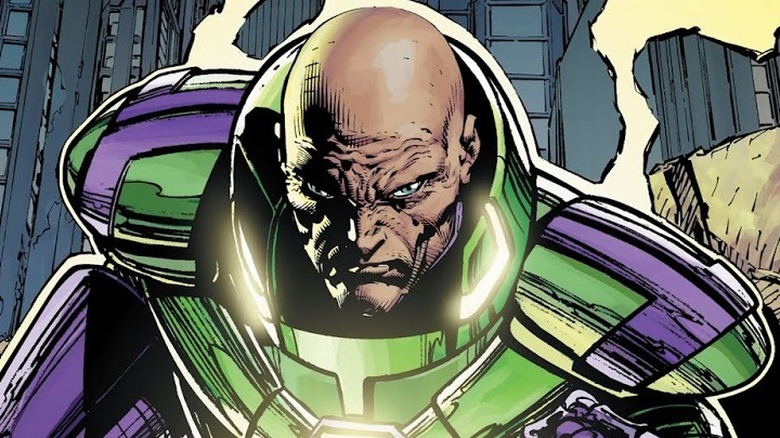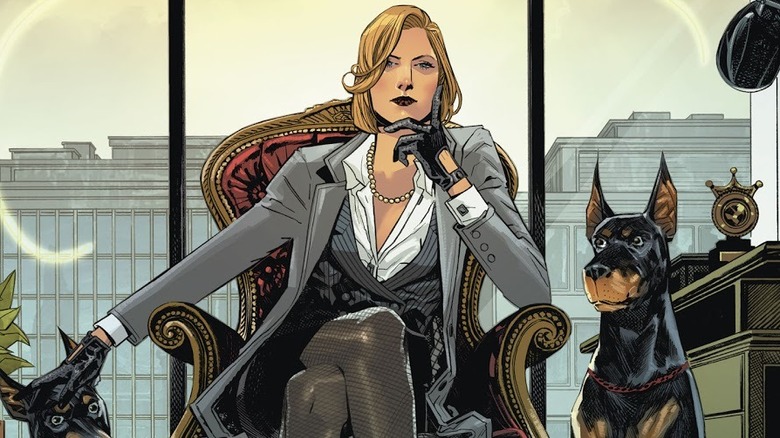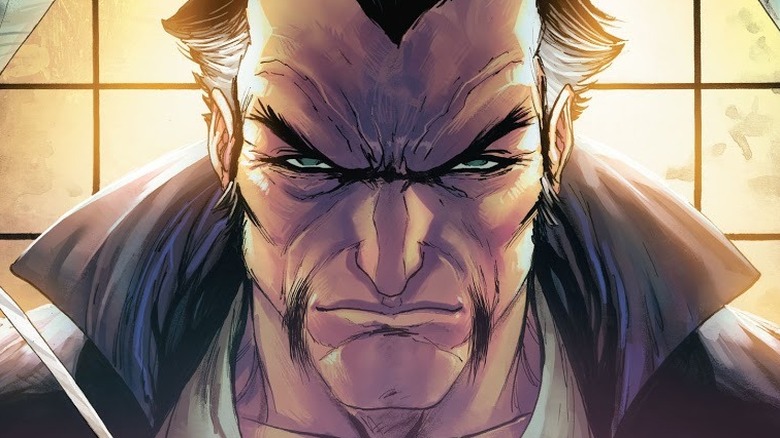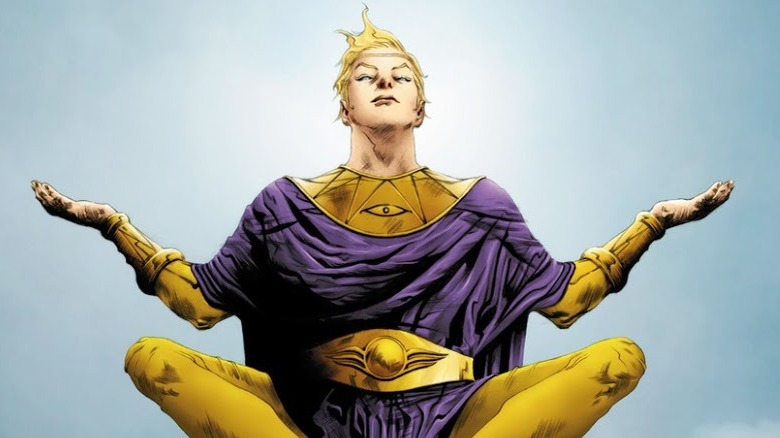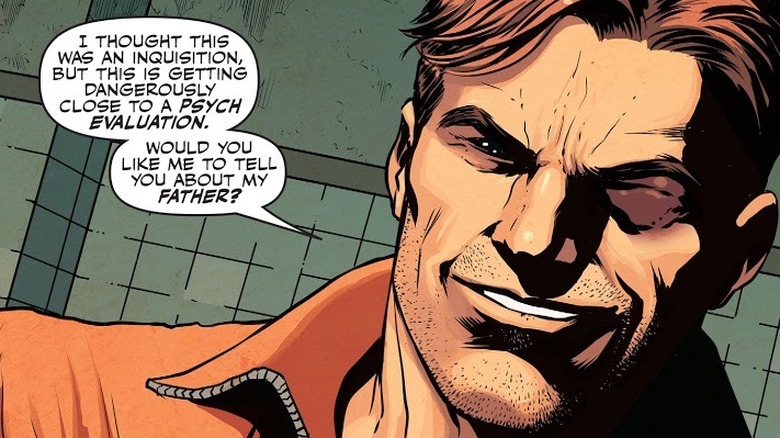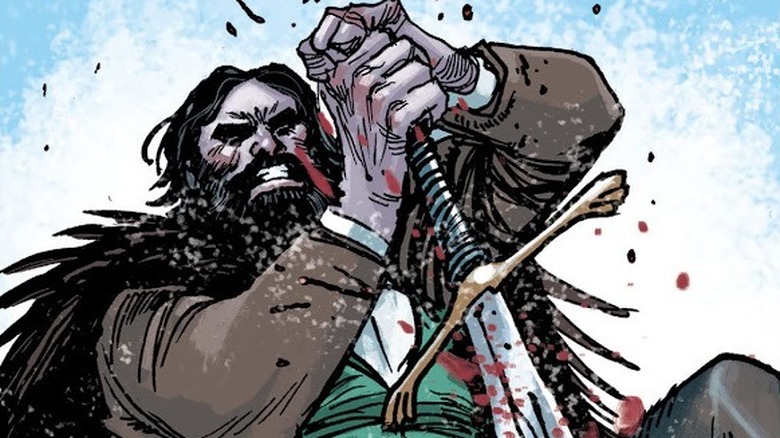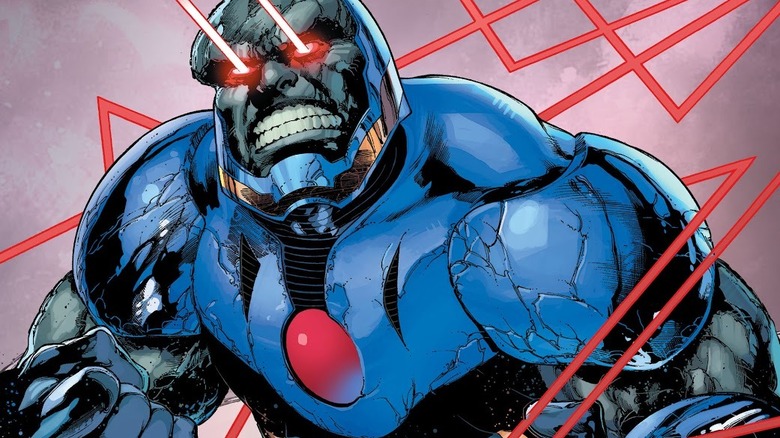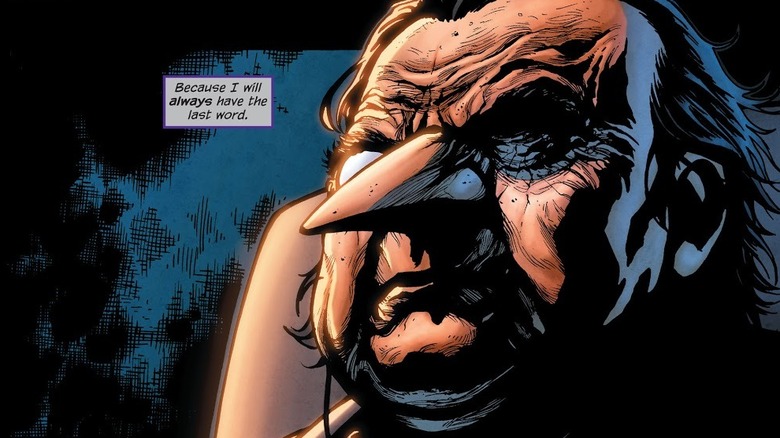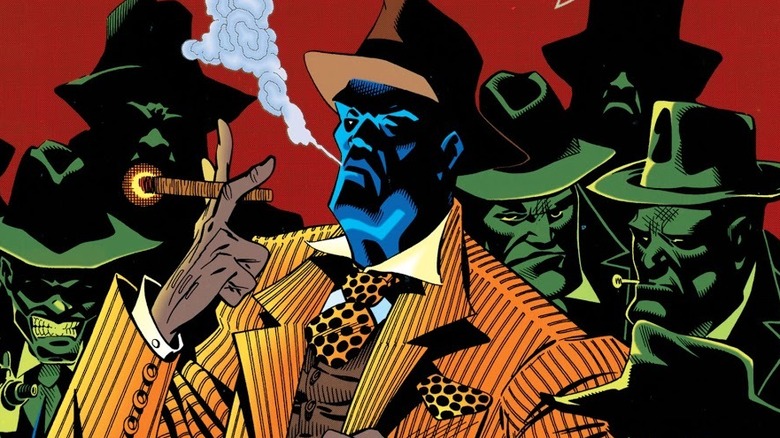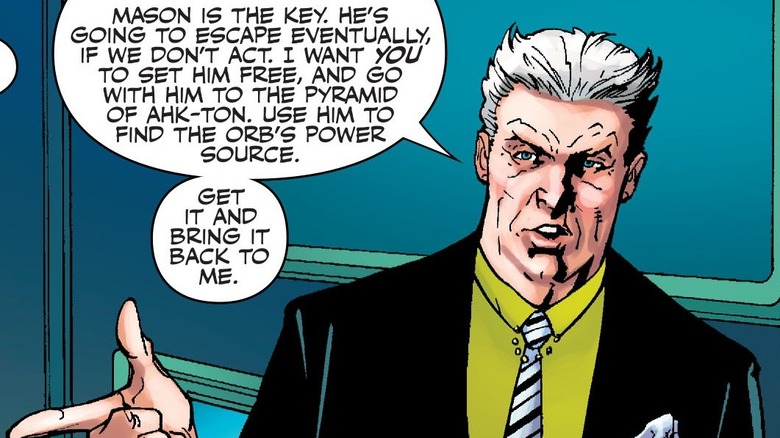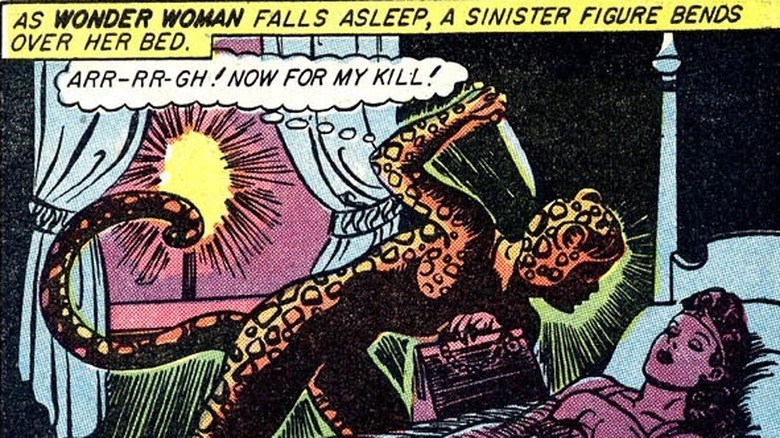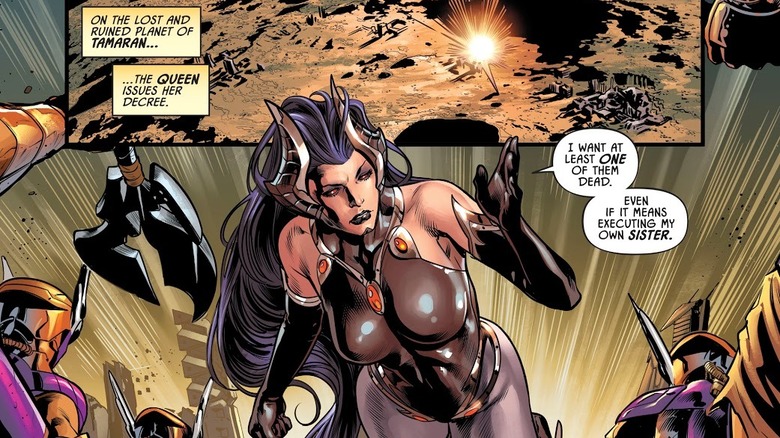Richest Villains In The DC Universe
The DC Universe's evil-doers wreak havoc in a plethora of ways. Deathstroke attacks his targets with deadly skill. Poison Ivy takes down threats to the natural world by any chlorophyll-powered means necessary. Granny Goodness twists the orphans of Apokolips into loyal soldiers through methods best not described here. They're bad, they're bold, and they're always brimming with new ideas for mayhem.
Then there are the bad guys who rely on cold, hard cash to get their evil-doing done. You might think these moneyed malcontents take the easy way out, compared to someone like the Joker — how impressive is it to hire henchmen, as opposed to building elaborate, smile-themed deathtraps? Look a little closer, however, and you'll realize that DC's wealthiest villains use their glittering resources in all sorts of inventive ways.
Some of them are brilliant magnates who attack our heroes from multiple angles, while others are immortal warriors with loot dating back thousands of years. Some even boast the sort of off-world wealth that can't be fully understood in terms of human currency. They're awful, they're affluent, and they're some of the best bad guys ever created: These are the richest villains in the DC Universe.
Lex Luthor
Superman's arch-enemy Lex Luthor isn't just an evil rich guy, he's the evil rich guy. As the head of LexCorp, a billion-dollar conglomerate, Luthor enjoys access to virtually every corner of the world, every level of the economy, and every seat of power. Though the good people at the Daily Planet are shocked when he becomes president of the United States in 2001's "Superman: Lex 2000" #1, it's honestly more surprising that it took him so long to claim that title for himself. Becoming president is an easy win for someone capable of cutting the global economy off at the knees whenever he wants.
Luthor's fortunes have risen and fallen over the years, of course. But no matter how down and out he gets, he's always capable of rising to the top once more. In 2006's "All-Star Superman" #5, he's imprisoned, surveilled, and headed for the electric chair. This is a far cry from private jets, yet Luthor is utterly untroubled. By the end of the issue, we know why: He's used his genius to carve an escape tunnel, and is soon as free and flush as ever. You can take away his stock portfolio, bank accounts, and freedom of movement, but that will never stop Lex Luthor. He'll be back in business in the blink of a Kryptonian eye, pulling the world's strings from behind a dozen shell companies.
Veronica Cale
Unlike Wonder Woman, who is literally blessed by the gods, Veronica Cale has had to claw her way to power. As 2004's "Wonder Woman" #202 details, Cale was raised in poverty by a hard-working single mother. Her immense brain power propelled her to Harvard, where she earned three doctorates by the time she was 22. Soon enough, she was creating companies, and before long, they were earning her millions. By the time she began tangling with Wonder Woman, her pharmaceutical corporation had made her a billionaire. The millions she spent hiring ne'er-do-wells to start a smear campaign against the amazing Amazon were essentially pocket change.
The 2016 "DC Rebirth" reboot tweaked the details of Cale's fortune: She currently runs Empire Enterprises, a tech powerhouse, rather than Cale-Anderson Pharmaceuticals. If anything, this has made her even more powerful. While Cale uses her cash to slander Wonder Woman in her first outing, she puts it toward actual divine intervention in her inaugural "Rebirth" arc. In 2017's "Wonder Woman" #20, Cale uses her riches and influence to summon the mythical Circe, transform Phobos and Deimos into dogs, and find Ares' prison beneath Themyscira. Though her malicious intentions are ultimately thwarted, she remains an unstoppably brilliant magnate with some of the most cutting-edge technology ever designed at her fingertips. Wonder Woman might have the gods on her side, but even gods can be swayed by stock options.
Ra's al Ghul
The DC Universe is full of long-lived people, aliens, gods, and sundry other super-types. But few of these ancient folks have used their many years as cannily as Ra's al Ghul has. You don't get to be known as "The Head of the Demon" by sitting on your laurels, after all — you get there with tenacity, cunning, and a whole lot of dollars.
Essentially immortal, through his control of the resurrection-enabling Lazarus Pits, Ra's has spent centuries building the League of Assassins into a planet-wide force of destruction, mastering martial arts, and collecting a vast reserve of riches. He's put his wealth to work in a number of ways over the years, but one of the most spectacular arrives in 1981's "Batman" #334. In this issue, Batman is held captive on Infinity Island, a lonely land completely dominated by Ra's al Ghul.
Centuries ago, he enslaved the island's native population, and has been using their labor to build his dragon hoard ever since. His wealth has finally allowed him to capture Batman, learn his true identity, and stand poised to buy Wayne Enterprises out from under him. Remember, Bruce Wayne is one of the wealthiest people in the DC universe. The fact that someone is able to undermine him financially is shocking — that he does so while obscuring his true identity from the world's greatest detective is mind-blowing.
Ozymandias
In 1987's "Watchmen" #11, Adrian Veidt reveals himself to be the seminal comic's true antagonist. He killed the Comedian. He framed Dr. Manhattan. He faked an assassination attempt on his own life to throw Rorschach off the scent. Why did he do these things? To execute his "masterstroke": The creation, teleportation, and execution of a psychic monster so terrifying, it will force the foolish, fractured world into unification. Nite Owl dismisses this as "mad scientist stuff," and skeptically asks when Adrian is even planning to pull this ridiculous scheme off. "Dan," Adrian replies, "I'm not a republic serial villain ... I did it 35 minutes ago."
Indeed he did: The next issue opens in New York City, where the corpses of half the city's people choke the streets. Though Veidt's mammoth wealth is apparent throughout "Watchmen" — Veidt Enterprises' action figures, perfumes, and "spark hydrants" are everywhere — this world-shaping act of violence makes it clear that he is one of the DC Universe's richest-ever bad guys. To pull this off, Veidt needs a private island, enormously rare substances, the labor of an untold number of elite scientists, the ability to grease a huge number of high-level palms, an Antarctic fortress — and those are just the basics. It's little wonder that he's able to travel to the mainstream DC Universe in 2018's "Doomsday Clock" #2: That sort of wealth makes dimension-hopping simple.
Maxwell Lord
Maxwell Lord has psychic abilities, vast reserves of cunning, and powerful contacts at all levels of society, superhuman and otherwise. Yet, it is his vast wealth that remains his most potent asset. Unlike many self-made kajillionaires on this list, Lord was lucky enough to be born rich: As Amanda Waller reveals in 2017's "Justice League" #12, his family's company (ChemTech Pharmaceuticals) made more money in a week than most people make in a lifetime. Raised to be cutthroat by his unsentimental mother, Lord turned his cash into stone-cold power — as well as more cash.
Lord's path to greater power varies, depending on the era. In his debut issue, 1987's "Justice League" #1, he's a young tycoon using his wealth to manipulate the Justice League. 2005's "Countdown to Infinite Crisis" describes him as "an expert in corporate takeovers and clandestine underhanding" who makes million-dollar deals with Simon Stagg over lunch. Perhaps most memorably, he is eventually revealed to be behind a massive plot to undermine the planet's superheroes, which ends in his death at the hands of Wonder Woman in 2005's "Wonder Woman" #219. You can't keep a good villain down, however: Lord is alive once more in the current canon, with connections to Checkmate, the OMAC Initiative, and the Cadmus Project, as Amanda Waller details. With mind control abilities and an eternally fat wallet at his disposal, Lord simply cannot be stopped.
Vandal Savage
Born a simple caveman thousands of years ago, mysterious forces made Vandal Savage immortal. As the ages have passed in a blur of conquest, advancement, and war, he has endured. His debut issue, 1943's "Green Lantern" #10, claims Julius Caesar, Khufu, and Genghis Khan were all actually Vandal Savage, living under assumed identities. Though later canon redacts some of these claims, it has also added more: 2010's "Batman: The Return of Bruce Wayne" #3 names Savage as Blackbeard, while 2006's "JSA Classified" #13 identifies him as the inventor of the carving knife, a survivor of the destruction of the Library of Alexandria, and a warrior who fought beside Moses.
Bottom line: Vandal Savage is older than currency itself. So, naturally, he's used the eons to build wealth. In addition to his many personas, Savage has served at the right hand of leaders like William the Conqueror, Napoleon, and Otto von Bismarck, treated French royalty as a physician, and run lucrative houses of ill repute. When hiring Jonah Hex in "Batman: The Return of Bruce Wayne" #4, he hands him a thick roll of cash and promises there's more where it came from. Sure enough, he soon reveals shining bars of "Bonaparte's gold." He's also stock-savvy, demonstrated by 1988's "The Flash" #14, where he claims responsibility for major Wall Street destabilization. Centuries of life might not make you a good person, but they will apparently make you an adept day trader.
Darkseid
Darkseid's greatest dream is to use the Anti-Life Equation to plunge all sentient beings into mindless despair. Given his absolutely massive resources, he just might get his wish some day.
Darkseid rules Apokolips, a planet of endless, wrenching nightmare. He'll probably never be ousted, though plenty have certainly tried — this immortal fiend possesses the sort of power that makes "divine" seem like a small word. In 2015's "Constantine" #22 and #23, he demonstrates cosmic awareness, possesses his own gravity, and sics his Parademons on the literal, Biblical Heaven. 2013's "Justice League" #23.1 reveals that Darkseid has managed to breed laughter out of Apokolips' populace. They don't call him a "New God" for nothing.
Specifically quantifying Darkseid's colossal wealth is difficult. What is the cash value of an entire ecumenopolis run on pure, unfiltered misery? It's hard to say for certain, but a case can definitely be made for Darkseid as the richest person in the entire DC Universe. In addition to his own powers, he commands vast forces, the infernal technology of an entire planet, and minions like Glorious Godfrey (who can control others with his voice). This is the sort of power that transcends wealth, but given that wealth remains a major part of the DC Universe he inhabits, his monetary value can be pondered. An answer quickly emerges: Darkseid is always as rich as he needs to be, which is nearly always richer than anyone else.
The Penguin
It only takes one glance at the Penguin to know he's rich. Clad in his tuxedo, top hat, and monocle, he looks as though he stepped out of a 19th century political cartoon criticizing robber barons. This isn't just a fashion statement, however — it's primarily a mission statement. Oswald Cobblepot is well aware that aesthetics are everything in a town like Gotham. His unique wardrobe (often paired with fabulous cars, weaponry, and accessories) makes something perfectly and immediately clear: He has money, and he knows how to use it.
Born to "one of Gotham's four founding families," as he puts it in 2012's "Detective Comics" #13, the Penguin has only ever known the good life. He proceeds to prove that by casually doubling Bruce Wayne's donation to a local community center, on the condition they name their new wing after Esther Cobblepot instead of Martha Wayne. Eye-popping acts like this are all over the Penguin's history, but his wealth is best embodied by his most successful and longest-running venture: the Iceberg Lounge.
A chic nightclub favored by Gotham's elite, the Lounge provides the Penguin with a just-legitimate-enough veneer of commerce and culture. The club's debut in 1995's "Detective Comics" #683 set the tone of his power forever after: As guests revel, he lurks in a swank booth, lord of the whole hedonistic castle. Anyone who looks his way will know he's in charge, and that's just the way he likes it.
Black Mask
Roman Sionis is Bruce Wayne's dark twin. As 1985's "Batman" #386 details, both boys were born to wealthy Gotham families with lavish summer homes, plenty of servants, and a permanent place in the papers. The Waynes and Sionises even expressed hope their sons might become friends, but as the years went on, that became more and more of a pipe dream. Young Roman learned to wear a genteel mask, just like his parents, but greed and cruelty lay festering beneath.
After his parents' (deeply suspicious) deaths, Roman inherited Janus Cosmetics, the company that made them rich. Though his obsession with masks runs it into the ground, he displays serious business acumen before the mania takes hold.
Those skills come to the fore once he becomes Black Mask, one of Gotham City's most terrifying, powerful mob bosses. Black Mask's enormous fortune allows him to relax in an expensive sauna while his goons do the dirty work, as happens in 2018's "Teen Titans Special" #1. Yet he's not averse to up-close villainy either — In #2003's "Catwoman" #14, 15, and 16, he brutally tortures Selina Kyle's loved ones with his own two hands. This particular outing exemplifies the long reach his money affords him: Selina is one of the savviest people in Gotham, yet she has no idea who's kidnapping her friends and family until she's right where Black Mask wants her. In a place like Gotham City, such obscurity is a gift possessed only by those with the sort of staggering wealth that can purchase it.
Simon Stagg
Simon Stagg is Metamorpho's arch-enemy. He is also occasionally his father-in-law: Sapphire Stagg; Simon's beloved daughter is Metamorpho's long-standing love interest. This leads to some seriously intense antagonism, which is ratcheted up even more dramatically by the fact that Simon Stagg is absolutely loaded.
As the head of Stagg Enterprises, he splashes millions of dollars around on a daily basis. One of his ventures actually gave Metamorpho his powers: Stagg sent explorer Rex Mason to Egypt in search of the transformative Orb of Ra in 1965's "The Brave and the Bold" #57. 2016's "Legends of Tomorrow" #1 ups Stagg's profit-seeking in its retelling of this origin: The Orb of Ra "could revolutionize the power industry," as he puts it, and he wants it under his control.
This isn't the first time Stagg's stacks of cash have brought him to the outer limits of possibility, nor is it the last. Consider Java, Stagg's faithful henchman: He's an actual caveman Stagg retrieves, revives, and shapes into a modern man, using Stagg Enterprises' gargantuan resources. Recent canon finds him opening an interdimensional portal to the Dark Multiverse in 2018's "The Terrifics" #1. No matter how much money he has, however, Metamorpho and his do-gooding pals always end up acting as a thorn in his side. Perhaps one day, he'll learn to take a page from his daughter's book and let morality trump greed ... but Metamorpho sure isn't holding his breath.
Priscilla Rich
Her name isn't ironic — Priscilla is, in fact, the kind of rich that demands a capital R. In her first appearance, 1943's "Wonder Woman" #6, the "aristocratic beauty" is introduced as the leader of the Junior League Committee for War Work. That second distinction is more impressive than you might realize, and a major indicator of her finances. The Junior League, a real-life American nonprofit organization with over a century's worth of do-gooding to its name, is deeply associated with wealth — its founder, Mary Harriman, was the debutante daughter of a railroad tycoon. No wonder Priscilla becomes the very first Cheetah out of pure, simmering envy, rather than a quotidian desire for cash. She has all the assets in the world, and the public still prefers Wonder Woman to her!
1966's "Wonder Woman" #160 reveals the true extent of Rich's jaw-droppingly huge resources. Having bent Wonder Woman and Steve Trevor to her will, she demands to be taken to her private island aboard the invisible jet. Not only does she own this verdant little spot, it houses her private army. This isn't a single squad we're talking about — she has rows of fighting men, multiple tanks, dozens of crates and barrels filled with who-knows-what, and some seriously impressive-looking field artillery. Other incarnations, like the one from 2016's "The Legend of Wonder Woman" #7, display similar wealth: This Priscilla caters to Nazi Germany's "extravagant needs" so well, she attends elite strategy meetings.
Blackfire
While her sister Starfire is a warm-hearted optimist, Blackfire is a bitter malcontent. This is understandable, if not necessarily forgivable: As 1982's "Tales of the New Teen Titans" #4 reveals, childhood illness left Blackfire weak and unable to fly. This doesn't just make her stick out like a sore thumb on Tamaran, it lost her the throne she was born to inherit. Starfire — lovely, healthy, lucky Starfire — was made heir, and Blackfire was put on the path to supervillainy.
Despite her family's distrust and her loss of status, however, Blackfire remains a literal princess. This luxe lifestyle is cut short when she and Starfire are captured by the Psions, but she maintains her many contacts across the galaxy, and retains a decidedly royal will to power. 1986's "New Teen Titans" #16, 17, and 18 see her take over Tamaran with nothing but charisma. More recent canon, like 2019's "Justice League Odyssey" #7, finds her ruling Tamaran as queen. This means she controls enormous reserves of treasure, a skilled army capable of flight, the entire planet's famously fertile fields, and a whole lot of cutting-edge space technology. Even if her fortunes change in the future, Blackfire is never down for long. The throne might have been taken from her, but she always finds her way back to power and position.
